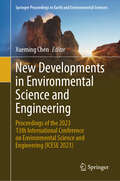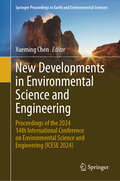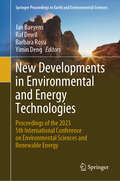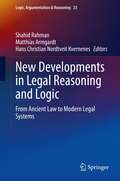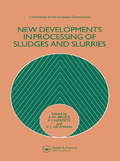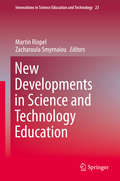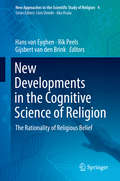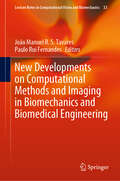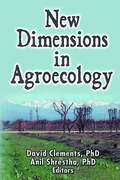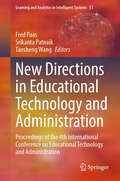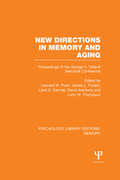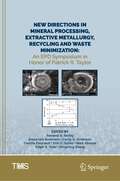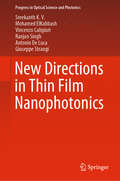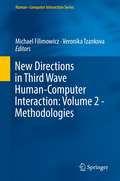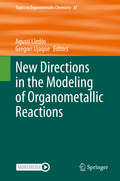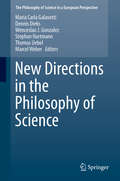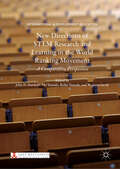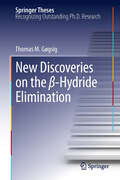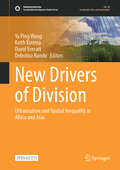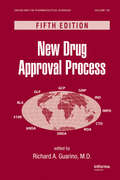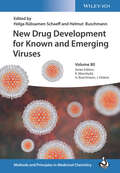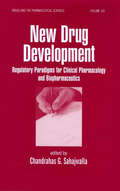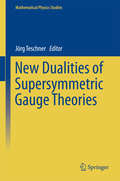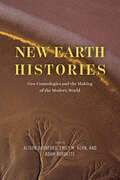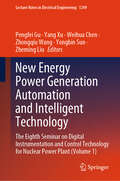- Table View
- List View
New Developments in Environmental Science and Engineering: Proceedings of the 2023 13th International Conference on Environmental Science and Engineering (ICESE 2023) (Springer Proceedings in Earth and Environmental Sciences)
by Xueming ChenThis book contains the peer-reviewed papers that were accepted and presented at the 2023 13th International Conference on Environmental Science and Engineering (ICESE 2023), held in Leuven, Belgium, September 8–10, 2023. The conference provides a forum for researchers and practitioners to address advances in the field of environmental science and engineering including problems, solutions, and research directions. The contents of the book cover emerging and diverse topics, including environmental systems approach, clean technologies, environmental restoration and ecological engineering, wastewater and sludge treatment, climate and climatic changes, atmospheric modeling and numerical prediction, waste minimization, recycling and reuse, solid waste management, carbon capture and storage, and sludge treatment and reuse.
New Developments in Environmental Science and Engineering: Proceedings of the 2024 14th International Conference on Environmental Science and Engineering (ICESE 2024) (Springer Proceedings in Earth and Environmental Sciences)
by Xueming ChenThis book consists of selected and peer reviewed papers which were presented at the 2024 14th International Conference on Environmental Science and Engineering (ICESE 2024). The conference was held in Hong Kong, China during September 20–22, 2024. It brought together innovative academicians and industrial experts in the field of environmental science and engineering in a common forum to promote their research and developmental activities. It also facilitated interchanging scientific information between researchers, developers, engineers, students, and practitioners working abroad. The book includes topics such as global environmental change and ecosystems management, environmental restoration and ecological engineering, water resources and river basin management, wastewater and sludge treatment, management of water treatment residuals, air pollution and control, carbon capture and storage, solid waste management, and technical aspects of treatment and disposal methods, among others.
New Developments in Environmental and Energy Technologies: Proceedings of the 2023 5th International Conference on Environmental Sciences and Renewable Energy (Springer Proceedings in Earth and Environmental Sciences)
by Raf Dewil Jan Baeyens Barbara Rossi Yimin DengThis book presents the selected papers from the 2023 5th International Conference on Environmental Sciences and Renewable Energy (ESRE 2023), which was held as a hybrid conference during June 19–21, 2023, in Vienna, Austria. The book includes first-rate, original research on various aspects of environmental sciences and renewable energy, offering perspectives from industrial and research communities to address current challenges in related fields. In the field of environmental science, wastewater and sludge treatment, air pollution and control, global environmental change, and ecosystems management are discussed. In the area of renewable energy, several hot topics are presented including solar energy, energy conservation and recovery, and hydrogen generation and application. This book supports the transfer of vital knowledge to next-generation researchers, students, and practitioners in academia and industry.
New Developments in Legal Reasoning and Logic: From Ancient Law to Modern Legal Systems (Logic, Argumentation & Reasoning #23)
by Shahid Rahman Matthias Armgardt Hans Christian Nordtveit KvernenesThis book intends to unite studies in different fields related to the development of the relations between logic, law and legal reasoning. Combining historical and philosophical studies on legal reasoning in Civil and Common Law, and on the often neglected Arabic and Talmudic traditions of jurisprudence, this project unites these areas with recent technical developments in computer science. This combination has resulted in renewed interest in deontic logic and logic of norms that stems from the interaction between artificial intelligence and law and their applications to these areas of logic. The book also aims to motivate and launch a more intense interaction between the historical and philosophical work of Arabic, Talmudic and European jurisprudence. The publication discusses new insights in the interaction between logic and law, and more precisely the study of different answers to the question: what role does logic play in legal reasoning? Varying perspectives include that of foundational studies (such as logical principles and frameworks) to applications, and historical perspectives.
New Developments in Processing of Sludges and Slurries
by P. L'Hermite A.M. Bruce P.J. NewmanThis book demonstrates the prospects for enhancing thickening or dewatering of sewage sludges and outlines some of the methods which might come into consideration. It is based on the proceedings of a 'round-table' meeting held at Bilthoven, The Netherlands, in April 1985.
New Developments in Science and Technology Education
by Martin Riopel Zacharoula SmyrnaiouThis book explores the beneficial impact of pedagogically updated practices and approaches in the teaching of science concepts as well as elaborates on future challenges and emerging issues that address Science and Technology Education. By pointing out new research directions it informs educational practices and bridges the gap between research and practice providing information, ideas and new perspectives. The book also promotes discussions and networking among scientists and stakeholders such as researchers, professors, students and companies developing educational software and ICT tools. The volume presents papers from the First International Conference on "New Developments in Science and Technology Education" (1st NDSTE) that was structured around four main thematic axes Modern Pedagogies in Science and Technology Education, New Technologies in Science and Technology Education, Teaching and Learning in the light of Inquiry learning Methods and Interest, Attitude and Motivation in Science.
New Developments in the Cognitive Science of Religion: The Rationality of Religious Belief (New Approaches to the Scientific Study of Religion #4)
by Rik Peels Hans Van Eyghen Gijsbert van den BrinkIt is widely thought that the cognitive science of religion (CSR) may have a bearing on the epistemic status of religious beliefs and on other topics in philosophy of religion. Epistemologists have used theories from CSR to argue both for and against the rationality of religious beliefs, or they have claimed that CSR is neutral vis-à-vis the epistemic status of religious belief. However, since CSR is a rapidly evolving discipline, a great deal of earlier research on the topic has become dated. Furthermore, most of the debate on the epistemic consequences of CSR has not taken into account insights from the philosophy of science, such as explanatory pluralism and explanatory levels. This volume overcomes these deficiencies. This volume brings together new philosophical reflection on CSR. It examines the influence of CSR theories on the epistemic status of religious beliefs; it discusses its impact on philosophy of religion; and it offers new insights for CSR. The book addresses the question of whether or not the plurality of theories in CSR makes epistemic conclusions about religious belief unwarranted. It also explores the impact of CSR on other topics in philosophy of religion like the cognitive consequences of sin and naturalism. Finally, the book investigates what the main theories in CSR aim to explain, and addresses the strengths and weaknesses of CSR.
New Developments on Computational Methods and Imaging in Biomechanics and Biomedical Engineering (Lecture Notes in Computational Vision and Biomechanics #999)
by Paulo Rui Fernandes João Manuel R. S. TavaresThis book gathers selected, extended and revised contributions to the 15th International Symposium on Computer Methods in Biomechanics and Biomedical Engineering (CMBBE2018), and the 3rd Conference on Imaging and Visualization, which took place on 26-29 March, 2018, in Lisbon, Portugal. The respective chapters highlight cutting-edge methods, e.g. new algorithms, image analysis techniques, and multibody modeling methods; and new findings obtained by applying them in biological and/or medical contexts. Original numerical studies, Monte Carlo simulations, FEM analyses and reaction-diffusion models are described in detail, together with intriguing new applications. The book offers a timely source of information for biologists, engineers, applied mathematicians and clinical researchers working on multidisciplinary projects, and is also intended to foster closer collaboration between these groups.
New Dimensions in Agroecology
by Anil Shrestha David ClementsReduce the environmentally negative aspects of industrial agriculture with an ecologically sound philosophy! New Dimensions in Agroecology explores the latest developments in the emerging science of agroecology, focusing on how these new concepts and cutting-edge tools will help minimize the impact of agriculture on the environment and fos
New Directions in Educational Technology and Administration: Proceedings of the 4th International Conference on Educational Technology and Administration (Learning and Analytics in Intelligent Systems #51)
by Srikanta Patnaik Fred Paas Taosheng Wang&“New Directions in Educational Technology and Administration&” emphasize the integration of cutting-edge tools like artificial intelligence, big data, and augmented reality to enhance teaching and learning experiences. This volume focus on creating more personalized, accessible, and equitable education systems that cater to diverse learners. At the same time, administrative innovations prioritize data-driven decision-making and streamlined operations to foster efficient institutional management. This volume also explores the most recent innovations and significant developments in the domain of Educational Technology and Administration, offering a thorough overview of the current landscape. It encompasses various dimensions including: Learning Analytics and Curriculum Design Online and Distance Learning Leadership in Modern Education By merging theoretical knowledge with practical applications, this book empowers educators, researchers, practitioners, and students to navigate and excel with the New Directions in Educational Technology and Administration with a focus on responsible technology for assessment and feedback, the book address challenges like digital equity and ethical implementation. By embracing these new directions, the education sector is poised to redefine learning environments and empower future generations.
New Directions in Memory and Aging: Proceedings of the George A. Talland Memorial Conference (Psychology Library Editions: Memory)
by Leonard W. Poon James L. Fozard Laird S. Cermak David Arenberg Larry W. ThompsonOriginally published in 1980, this book contains the proceedings from a memorial conference held in honour of George A. Talland, who made a significant contribution to the area of memory and aging. The major objective of the volume was to stimulate research towards a more comprehensive understanding of age related differences in memory. It was also hoped it would provide direction for the application and utilization of research findings in the evaluation and treatment of memory complaints and memory difficulties experienced by the elderly. The book was intended for two broad groups of scientists. The first being researchers in the psychology of memory, and those who were currently active in the research on aging at the time. The second group was those concerned with applying current research findings to the diagnosis and treatment of problems of memory.
New Directions in Mineral Processing, Extractive Metallurgy, Recycling and Waste Minimization: An EPD Symposium in Honor of Patrick R. Taylor (The Minerals, Metals & Materials Series)
by Mark Strauss Mingming Zhang Camille Fleuriault Alexandra Anderson Ramana G. Reddy Corby G. Anderson Erik D. Spiller Edgar E. VidalThis collection addresses new research and technology for increased efficiency, energy reduction, and waste minimization in mineral processing, extractive metallurgy, and recycling. Professor Patrick R. Taylor and his students have been studying these topics for the past 45 years. Chapters include new directions in:· Mineral Processing · Hydrometallurgy · Pyrometallurgy · Electrometallurgy · Metals and E waste recycling · Waste minimization (including by-product recovery) · Innovations in metallurgical engineering education and curriculum development
New Directions in Thin Film Nanophotonics (Progress in Optical Science and Photonics #6)
by Mohamed ElKabbash Vincenzo Caligiuri Ranjan Singh Giuseppe Strangi Sreekanth K. V. Antonio De LucaThis book highlights recent advances in thin-film photonics, particularly as building blocks of metamaterials and metasurfaces. Recent advances in nanophotonics has demonstrated remarkable control over the electromagnetic field by tailoring the optical properties of materials at the subwavelength scale which results in the emergence of metamaterials and metasurfaces. However, most of the proposed platforms require intense lithography which makes them of minor practical relevance. Stacked ultrathin-films of dielectrics, semi-conductors, and metals are introduced as an alternative platform that perform unique or similar functionalities. This book discusses the new era of thin film photonics and its potential applications in perfect and selective light absorption, structural coloring, biosensing, enhanced spontaneous emission, reconfigurable photonic devices and super lensing.
New Directions in Third Wave Human-Computer Interaction: Volume 2 - Methodologies (Human–Computer Interaction Series)
by Michael Filimowicz Veronika TzankovaThis is the first extensive compilation documenting contemporary third wave HCI, covering key methodological developments at the leading edge of human-computer interactions. Now in its second decade as a major current of HCI research, the third wave integrates insights from the humanities and social sciences to emphasize human dimensions beyond workplace efficiency or cognitive capacities. Where the earliest HCI work has been strongly based on the concept of human-machine coupling, which expanded to workplace collaboration as computers came into mainstream professional use, today HCI can connect to almost any human experience because there are new applications for every aspect of daily life.Volume 2 - Methodologies covers methodological approaches grounded in autoethnography, empathy-based design, crowdsourcing, psychometrics, user engagement, speculative design, somatics, embodied cognition, peripheral practices and transdisciplinarity.
New Directions in the Modeling of Organometallic Reactions (Topics in Organometallic Chemistry #67)
by Agustí Lledós Gregori UjaqueThis book focuses on the computational modeling of organometallic reactivity. In recent years, computational methods, particularly those based on Density Functional Theory (DFT) have been fully incorporated into the toolbox of organometallic chemists’ methods. Nowadays, energy profiles of multistep processes are routinely calculated, and detailed mechanistic pictures of the reactions arise from these calculations. This type of analysis is increasingly performed even by experimentalists themselves. The volume aims to connect established computational organometallics with the more recent theoretical and methodological developments applied to this field. This would allow broadening of the simulation scope toward emergent organometallic areas (as ligand design or photoactivated processes), to narrow the gap between calculations and experiments (microkinetic models) and even to discover new reactions (automated methods). Given the broad interest and extensive application that computational methods have reached within the organometallic community, this new volume will attract the interest of both experimental and computational organometallic chemists.
New Directions in the Philosophy of Science
by Thomas Uebel Wenceslao J. Gonzalez Stephan Hartmann Dennis Dieks Maria Carla Galavotti Marcel WeberThis volume sheds light on still unexplored issues and raises new questions in the main areas addressed by the philosophy of science. Bringing together selected papers from three main events, the book presents the most advanced scientific results in the field and suggests innovative lines for further investigation. It explores how discussions on several notions of the philosophy of science can help different scientific disciplines in learning from each other. Finally, it focuses on the relationship between Cambridge and Vienna in twentieth century philosophy of science. The areas examined in the book are: formal methods, the philosophy of the natural and life sciences, the cultural and social sciences, the physical sciences and the history of the philosophy of science.
New Directions of STEM Research and Learning in the World Ranking Movement: A Comparative Perspective (International and Development Education)
by Reiko Yamada W. James Jacob John N. Hawkins Aki YamadaThis volume analyzes the dominance of STEM fields in various university rankings and the reasons why many governments in the world disproportionately give value to STEM fields. Secondly, although there is general agreement that STEM fields are important, chapter authors also examine the role of interdisciplinary and multidisciplinary approaches for a revised STEM education as well as implications for the future. The book presents examples from the United States, Canada, Japan, Korea, and Taiwan.
New Discoveries on the β-Hydride Elimination
by Thomas M. GøgsigThe work presented in Thomas M. Gøgsig's thesis deals with the discovery of new metal-catalyzed transformations ranging from Kumada-, Heck- and Suzuki-type reactions. The thesis starts with a formidable introduction to Pd-catalyzed cross-coupling reactions. New results have been obtained on: (i) Pd-catalyzed 1,2-migration reactions, (ii) Pd-catalyzed Heck reactions employing heteroaromatic tosylates, (iii) Ni-catalyzed Heck reactions, and (iv) Pd-catalyzed carbonylative Heck reaction. Metal-catalyzed cross-coupling reactions are today a highly competititve field (the 2010 Nobel Prize in Chemistry was awarded "for palladium-catalyzed cross couplings in organic synthesis", the 2001 and 2005 Nobel Prizes in closely related fields). Thomas M. Gøgsig obtained new results in his thesis that will help to improve the outcome of catalytic processes and improve their scope. The results will thus become key references for tomorrow's new applications. All chapters include insightful discussions and in-depth descriptions of the key principles of these new discoveries.
New Drivers of Division: Urbanisation and Spatial Inequality in Africa and Asia (Sustainable Development Goals Series)
by David Everatt Keith Kintrea Ya Ping Wang Debolina KunduThis open access book provides recent trends of urbanization and inequality in Africa and Asia. It addresses the inequality challenges of urbanization and large-scale rural-to-urban migration. It answers questions around socio-economic and spatial inequalities and how serious those are in cities in Africa and Asia under 21st-century urbanization. Chapters demonstrate how the old neighborhood division in cities based on race, ethnicity, religion, apartheid, tribes, caste and migrant are replaced by social class through sorting in the housing market. The analyses go beyond the normal income inequality consideration and take a broader perspective on inequality by considering these issues at the neighborhood level to reveal the new spatial divisions in cities. As such, it is essential reading for academics and students in urban studies, sociology, geography, planning, and policymakers working on urban development around the world.
New Drug Approval Process (Drugs and the Pharmaceutical Sciences)
by Richard A. GuarinoThe thoroughly revised Fifth Edition of New Drug Approval Process supplies readers with the latest global changes that affect pharmaceutical product approval and influence how new products are researched and marketed.Updated chapters include:advances in international regulatory requirements, including ICH guidelines and harmonizationa step-by-step
New Drug Development for Known and Emerging Viruses (Methods & Principles in Medicinal Chemistry)
by Raimund Mannhold Jörg HolenzDiscusses how to fight Ebola, SARS Corona, and other known or emerging human viruses by building on the successes in antiviral therapy of the past decades Written by leading medicinal chemists from academia and industry, this book discusses the entire field of antiviral drug discovery and development from a medicinal chemistry perspective, focusing on antiviral drugs, targets, and viral disease mechanisms. It provides an outlook on emerging pathogens such as Ebola, Zika, West Nile, Lassa, and includes a chapter on SARS Coronoavirus-2 causing the present pandemic. New Drug Development for Known and Emerging Viruses describes the discovery and development process for antiviral agents for different classes of viruses and targets based on the experiences from the nine human viruses for which approved drugs are on the market (HIV, HCV, Influenza, RSV, HBV, HPV, HCMV, HSV, and VZV). It covers the properties and potential of 20 classes of currently approved antivirals, including combination drugs, and looks at novel antiviral strategies against emerging viruses. Covers the entire field of antiviral drug discovery and development Addresses the need for antiviral drugs to combat major health threats such as Ebola, Zika, West Nile, and SARS Coronavirus-2 Summarizes the successes of the past 15 years in developing ground-breaking medicines against 9 major human viruses, both from the medicinal chemistry and the pharmacological angle Discusses practical and strategic challenges in the drug discovery and development process, including screening technologies, latency, and toxicity issues New Developments in Antiviral Drugs is an important book for medicinal chemists, pharmaceutical chemists, virologists, and epidemiologists, and will be of great interest to those in the ;pharmaceutical industry and public health agencies.
New Drug Development: Regulatory Paradigms for Clinical Pharmacology and Biopharmaceutics (Drugs and the Pharmaceutical Sciences)
by Chandrahas G. SahajwallaHighlighting key points from the latest regulatory requirements, New Drug Development helps those new to the world of pharmaceutical development understand regulatory steps, reduce cost by avoiding unnecessary trials, and attain guidance through each step of the drug approval process. This volume acquaints readers with procedures that determine the
New Dualities of Supersymmetric Gauge Theories
by Jörg TeschnerThis book reviews a number of spectacular advances that have been made in the study of supersymmetric quantum field theories in the last few years. Highlights include exact calculations of Wilson loop expectation values, and highly nontrivial quantitative checks of the long-standing electric-magnetic duality conjectures The book starts with an introductory article presenting a survey of recent advances, aimed at a wide audience with a background and interest in theoretical physics. The following articles are written for advanced students and researchers in quantum field theory, string theory and mathematical physics, our goal being to familiarize these readers with the forefront of current research. The topics covered include recent advances in the classification and vacuum structure of large families of N=2 supersymmetric field theories, followed by an extensive discussion of the localisation method, one of the most powerful tools for exact studies of supersymmetric field theories. The quantities that have been studied in this way are partition functions, expectation values of line operators, and supersymmetric indices. The book also reviews recently discovered connections between SUSY field theories in four dimensions and two-dimensional conformal field theory. These connections have a counterpart in relations between three-dimensional gauge theories and Chern-Simons theory; the book's closing chapters explore connections with string theory.
New Earth Histories: Geo-Cosmologies and the Making of the Modern World
by Dipesh ChakrabartyA kaleidoscopic rethinking of how we come to know the earth. This book brings the history of the geosciences and world cosmologies together, exploring many traditions, including Chinese, Pacific, Islamic, South and Southeast Asian conceptions of the earth’s origin and makeup. Together the chapters ask: How have different ideas about the sacred, animate, and earthly changed modern environmental sciences? How have different world traditions understood human and geological origins? How does the inclusion of multiple cosmologies change the meaning of the Anthropocene and the global climate crisis? By carefully examining these questions, New Earth Histories sets an ambitious agenda for how we think about the earth. The chapters consider debates about the age and structure of the earth, how humans and earth systems interact, and how empire has been conceived in multiple traditions. The methods the authors deploy are diverse—from cultural history and visual and material studies to ethnography, geography, and Indigenous studies—and the effect is to highlight how earth knowledge emerged from historically specific situations. New Earth Histories provides both a framework for studying science at a global scale and fascinating examples to educate as well as inspire future work. Essential reading for students and scholars of earth science history, environmental humanities, history of science and religion, and science and empire.
New Energy Power Generation Automation and Intelligent Technology: The Eighth Seminar on Digital Instrumentation and Control Technology for Nuclear Power Plant (Volume 1) (Lecture Notes in Electrical Engineering #1249)
by Yang Xu Weihua Chen Zheming Liu Pengfei Gu Yongbin Sun Zhongqiu WangThis book is the 1st volume of proceedings of the 1st Smart Nuclear Power Technology Forum and the 8th China Nuclear Power Plant Digital Technology and Application Seminar held in Shenzhen, China in June 2024. This seminar aims to explore the software and hardware of digital and instrument control (I&C) systems in nuclear power plants, such as inspection, testing, certification and research of sensors, actuators and control systems, and the application of electrical and intelligent operation and maintenance technologies. It aims to provide a platform for experts, scholars and nuclear power practitioners to exchange technology and share experience. At the same time, it also provides a platform for the combination of universities and enterprises in the aspects of production, education and research, and promotes the safe development of nuclear power plants. In addition, readers will encounter new ideas to achieve more efficient and safer instruments and control systems.
